BUICK RANDEZVOUS 2007 Owner's Manual
Manufacturer: BUICK, Model Year: 2007, Model line: RANDEZVOUS, Model: BUICK RANDEZVOUS 2007Pages: 528, PDF Size: 2.99 MB
Page 341 of 528
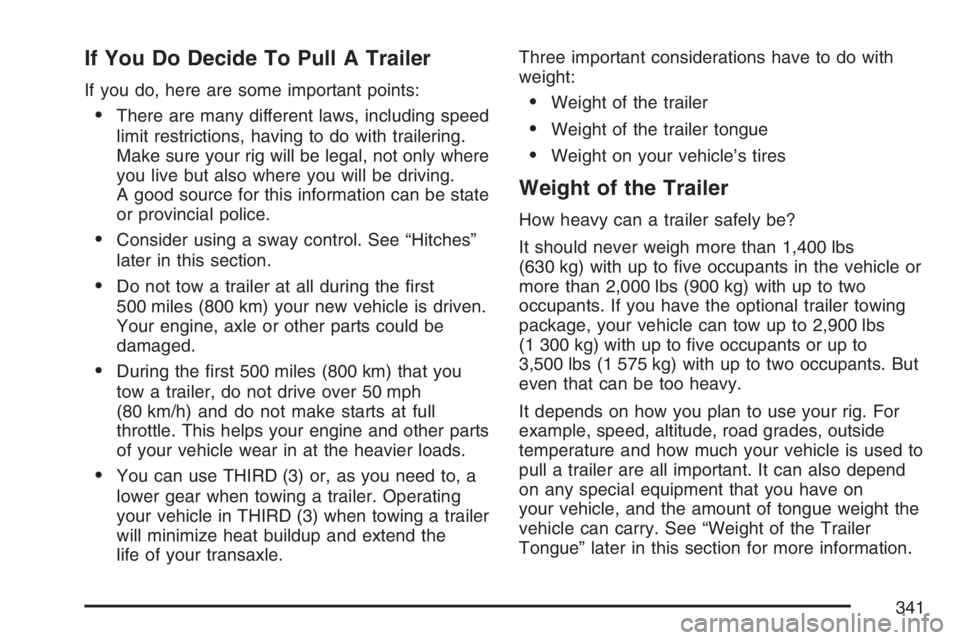
If You Do Decide To Pull A Trailer
If you do, here are some important points:
There are many different laws, including speed
limit restrictions, having to do with trailering.
Make sure your rig will be legal, not only where
you live but also where you will be driving.
A good source for this information can be state
or provincial police.
Consider using a sway control. See “Hitches”
later in this section.
Do not tow a trailer at all during the �rst
500 miles (800 km) your new vehicle is driven.
Your engine, axle or other parts could be
damaged.
During the �rst 500 miles (800 km) that you
tow a trailer, do not drive over 50 mph
(80 km/h) and do not make starts at full
throttle. This helps your engine and other parts
of your vehicle wear in at the heavier loads.
You can use THIRD (3) or, as you need to, a
lower gear when towing a trailer. Operating
your vehicle in THIRD (3) when towing a trailer
will minimize heat buildup and extend the
life of your transaxle.Three important considerations have to do with
weight:
Weight of the trailer
Weight of the trailer tongue
Weight on your vehicle’s tires
Weight of the Trailer
How heavy can a trailer safely be?
It should never weigh more than 1,400 lbs
(630 kg) with up to �ve occupants in the vehicle or
more than 2,000 lbs (900 kg) with up to two
occupants. If you have the optional trailer towing
package, your vehicle can tow up to 2,900 lbs
(1 300 kg) with up to �ve occupants or up to
3,500 lbs (1 575 kg) with up to two occupants. But
even that can be too heavy.
It depends on how you plan to use your rig. For
example, speed, altitude, road grades, outside
temperature and how much your vehicle is used to
pull a trailer are all important. It can also depend
on any special equipment that you have on
your vehicle, and the amount of tongue weight the
vehicle can carry. See “Weight of the Trailer
Tongue” later in this section for more information.
341
Page 342 of 528

Maximum trailer weight is calculated assuming
only the driver is in the tow vehicle and it has all
the required trailering equipment. The weight
of additional optional equipment, passengers and
cargo in the tow vehicle must be subtracted
from the maximum trailer weight.
You can ask your dealer for our trailering
information or advice, or you can write us at:
Buick Customer Assistance Center
P.O. Box 33136
Detroit, MI 48232-5136
In Canada, write to:
General Motors of Canada Limited
Customer Communication Centre, 163-005
1908 Colonel Sam Drive
Oshawa, Ontario L1H 8P7Weight of the Trailer Tongue
The tongue load (A) of any trailer is an important
weight to measure because it affects the total
or gross weight of your vehicle. The Gross Vehicle
Weight (GVW) includes the curb weight of the
vehicle, any cargo you may carry in it, and
the people who will be riding in the vehicle. If you
have a lot of options, equipment, passengers,
or cargo in the vehicle, it will reduce the tongue
weight your vehicle can carry, which will also
reduce the trailer weight your vehicle can tow. And
if you will tow a trailer, you must add the tongue
load to the GVW because your vehicle will be
carrying that weight, too. SeeLoading Your
Vehicle on page 332for more information about
your vehicle’s maximum load capacity.
342
Page 343 of 528

If you are using a weight-carrying or weight
distributing hitch, the trailer tongue weight (A)
should be 10 percent to 15 percent of the
total loaded trailer weight (B). Do not exceed the
maximum allowable tongue weight for your
vehicle.
After you have loaded your trailer, weigh the trailer
and then the tongue, separately, to see if the
weights are proper. If they are not, you may be
able to get them right simply by moving some
items around in the trailer.Trailering may also be limited by the vehicle’s
ability to carry tongue weight. Tongue weight
cannot cause the vehicle to exceed the GVWR
(Gross Vehicle Weight Rating) or the RGAWR
(Rear Gross Axle Weight Rating). The effect
of additional weight may reduce your trailering
capacity more than the total of the additional
weight.
Consider the following example:
A vehicle model base weight is 5,500 lbs
(2 495 kg); 2,800 lbs (1 270 kg) at the front axle
and 2,700 lbs (1 225 kg) at the rear axle. It
has a GVWR of 7,200 lbs (3 266 kg), a RGAWR
of 4,000 lbs (1 814 kg) and a GCWR (Gross
Combination Weight Rating) of 14,000 lbs
(6 350 kg). The trailer rating should be:
343
Page 344 of 528
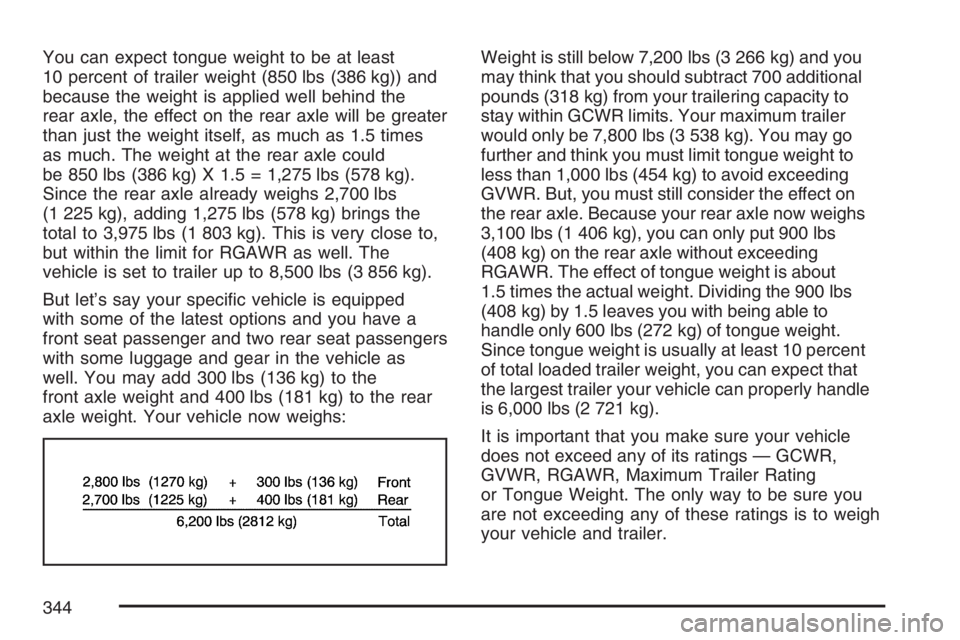
You can expect tongue weight to be at least
10 percent of trailer weight (850 lbs (386 kg)) and
because the weight is applied well behind the
rear axle, the effect on the rear axle will be greater
than just the weight itself, as much as 1.5 times
as much. The weight at the rear axle could
be 850 lbs (386 kg) X 1.5 = 1,275 lbs (578 kg).
Since the rear axle already weighs 2,700 lbs
(1 225 kg), adding 1,275 lbs (578 kg) brings the
total to 3,975 lbs (1 803 kg). This is very close to,
but within the limit for RGAWR as well. The
vehicle is set to trailer up to 8,500 lbs (3 856 kg).
But let’s say your speci�c vehicle is equipped
with some of the latest options and you have a
front seat passenger and two rear seat passengers
with some luggage and gear in the vehicle as
well. You may add 300 lbs (136 kg) to the
front axle weight and 400 lbs (181 kg) to the rear
axle weight. Your vehicle now weighs:Weight is still below 7,200 lbs (3 266 kg) and you
may think that you should subtract 700 additional
pounds (318 kg) from your trailering capacity to
stay within GCWR limits. Your maximum trailer
would only be 7,800 lbs (3 538 kg). You may go
further and think you must limit tongue weight to
less than 1,000 lbs (454 kg) to avoid exceeding
GVWR. But, you must still consider the effect on
the rear axle. Because your rear axle now weighs
3,100 lbs (1 406 kg), you can only put 900 lbs
(408 kg) on the rear axle without exceeding
RGAWR. The effect of tongue weight is about
1.5 times the actual weight. Dividing the 900 lbs
(408 kg) by 1.5 leaves you with being able to
handle only 600 lbs (272 kg) of tongue weight.
Since tongue weight is usually at least 10 percent
of total loaded trailer weight, you can expect that
the largest trailer your vehicle can properly handle
is 6,000 lbs (2 721 kg).
It is important that you make sure your vehicle
does not exceed any of its ratings — GCWR,
GVWR, RGAWR, Maximum Trailer Rating
or Tongue Weight. The only way to be sure you
are not exceeding any of these ratings is to weigh
your vehicle and trailer.
344
Page 345 of 528

Total Weight on Your Vehicle’s Tires
Be sure your vehicle’s tires are in�ated to the
upper limit for cold tires. You will �nd these
numbers on the Certi�cation/Tire Label at the rear
edge of the driver’s door, or seeLoading Your
Vehicle on page 332. Do not go over the
GVW limit for your vehicle, including the weight of
the trailer tongue.
Hitches
It is important to have the correct hitch equipment.
Crosswinds, large trucks going by, and rough
roads are a few reasons why you will need
the right hitch. Here are some rules to follow:
If you will be pulling a trailer that, when loaded,
will weigh more than 2,000 lbs (900 kg), use a
properly mounted, weight-carrying hitch and
sway control of the proper size. This
equipment is very important for proper vehicle
loading and good handling while driving.
Will you have to make any holes in the body of
your vehicle when you install a trailer hitch?If you do, remember to seal the holes when you
remove the hitch. If you do not seal them,
deadly carbon monoxide (CO) from your
exhaust can get into your vehicle. SeeEngine
Exhaust on page 140. Dirt and water can, too.
Safety Chains
You should always attach chains between your
vehicle and your trailer. Cross the safety
chains under the tongue of the trailer to help
prevent the tongue from contacting the road if it
becomes separated from the hitch. Instructions
about safety chains may be provided by the hitch
manufacturer or by the trailer manufacturer.
Follow the manufacturer’s recommendation for
attaching safety chains and do not attach them to
the bumper. Always leave just enough slack so
you can turn with your rig. Never allow safety
chains to drag on the ground.
345
Page 346 of 528

Trailer Brakes
If your trailer weighs more than 1,000 lbs (450 kg)
loaded, then it needs its own brakes – and they
must be adequate. Be sure to read and follow the
instructions for the trailer brakes so you will be
able to install, adjust and maintain them properly.
Because your vehicle may have anti-lock
brakes, do not try to tap into your vehicle’s brake
system. If you do, both brake systems will not
work well, or at all.
Driving with a Trailer
{CAUTION:
If you have a rear-most window open and
you pull a trailer with your vehicle, carbon
monoxide (CO) could come into your
vehicle. You cannot see or smell CO. It
can cause unconsciousness or death. See
Engine Exhaust on page 140. To maximize
your safety when towing a trailer:
Have your exhaust system inspected
for leaks, and make necessary repairs
before starting on your trip.
Keep the rear-most windows closed.
CAUTION: (Continued)
346
Page 347 of 528
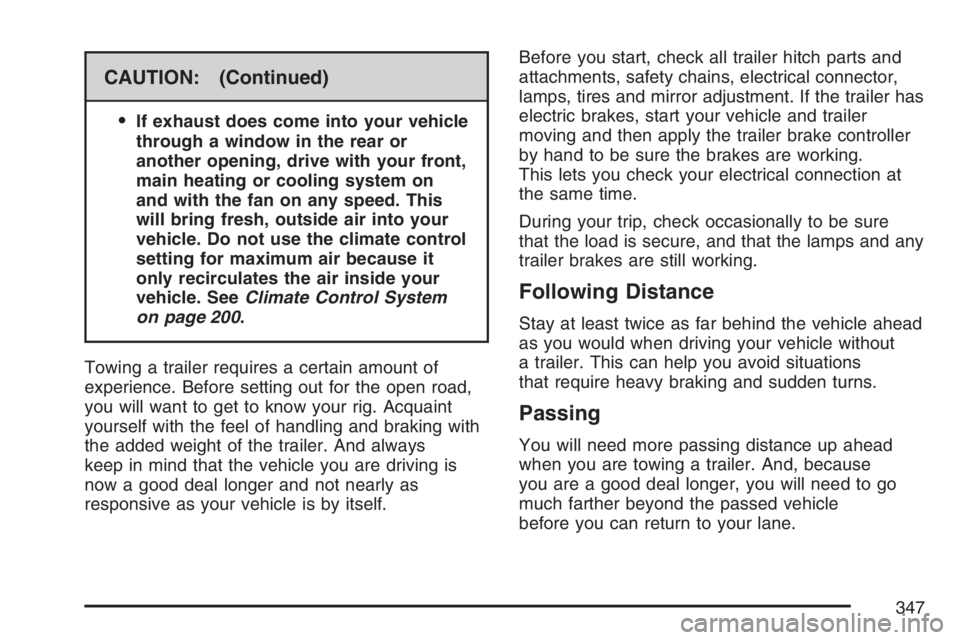
CAUTION: (Continued)
If exhaust does come into your vehicle
through a window in the rear or
another opening, drive with your front,
main heating or cooling system on
and with the fan on any speed. This
will bring fresh, outside air into your
vehicle. Do not use the climate control
setting for maximum air because it
only recirculates the air inside your
vehicle. SeeClimate Control System
on page 200.
Towing a trailer requires a certain amount of
experience. Before setting out for the open road,
you will want to get to know your rig. Acquaint
yourself with the feel of handling and braking with
the added weight of the trailer. And always
keep in mind that the vehicle you are driving is
now a good deal longer and not nearly as
responsive as your vehicle is by itself.Before you start, check all trailer hitch parts and
attachments, safety chains, electrical connector,
lamps, tires and mirror adjustment. If the trailer has
electric brakes, start your vehicle and trailer
moving and then apply the trailer brake controller
by hand to be sure the brakes are working.
This lets you check your electrical connection at
the same time.
During your trip, check occasionally to be sure
that the load is secure, and that the lamps and any
trailer brakes are still working.
Following Distance
Stay at least twice as far behind the vehicle ahead
as you would when driving your vehicle without
a trailer. This can help you avoid situations
that require heavy braking and sudden turns.
Passing
You will need more passing distance up ahead
when you are towing a trailer. And, because
you are a good deal longer, you will need to go
much farther beyond the passed vehicle
before you can return to your lane.
347
Page 348 of 528
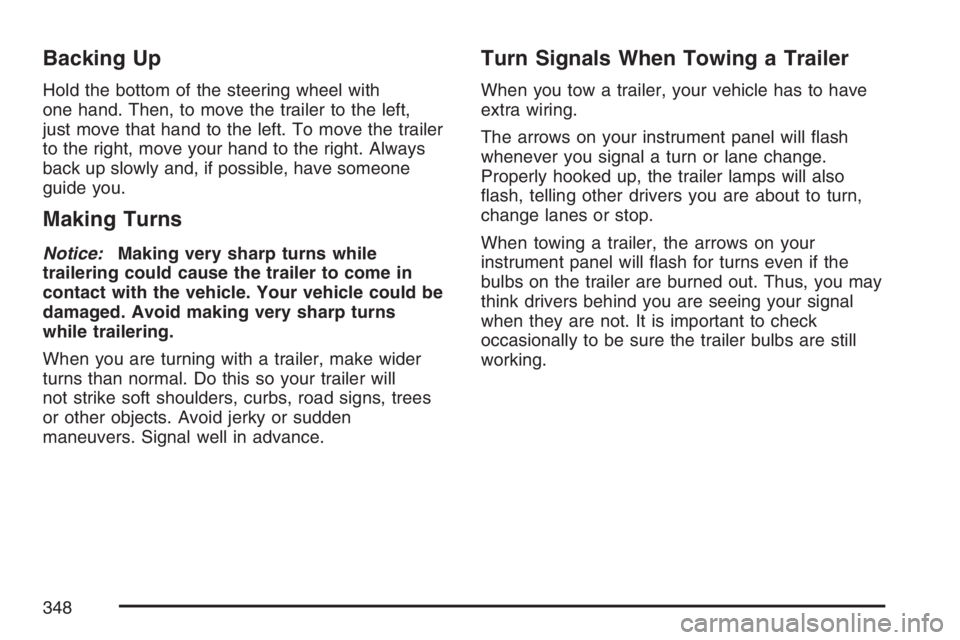
Backing Up
Hold the bottom of the steering wheel with
one hand. Then, to move the trailer to the left,
just move that hand to the left. To move the trailer
to the right, move your hand to the right. Always
back up slowly and, if possible, have someone
guide you.
Making Turns
Notice:Making very sharp turns while
trailering could cause the trailer to come in
contact with the vehicle. Your vehicle could be
damaged. Avoid making very sharp turns
while trailering.
When you are turning with a trailer, make wider
turns than normal. Do this so your trailer will
not strike soft shoulders, curbs, road signs, trees
or other objects. Avoid jerky or sudden
maneuvers. Signal well in advance.
Turn Signals When Towing a Trailer
When you tow a trailer, your vehicle has to have
extra wiring.
The arrows on your instrument panel will �ash
whenever you signal a turn or lane change.
Properly hooked up, the trailer lamps will also
�ash, telling other drivers you are about to turn,
change lanes or stop.
When towing a trailer, the arrows on your
instrument panel will �ash for turns even if the
bulbs on the trailer are burned out. Thus, you may
think drivers behind you are seeing your signal
when they are not. It is important to check
occasionally to be sure the trailer bulbs are still
working.
348
Page 349 of 528
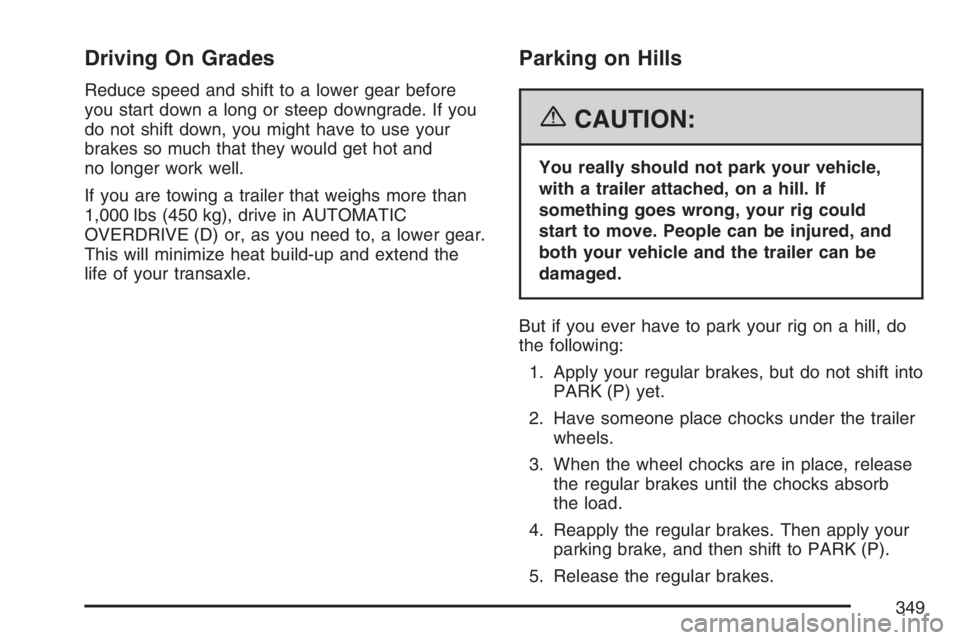
Driving On Grades
Reduce speed and shift to a lower gear before
you start down a long or steep downgrade. If you
do not shift down, you might have to use your
brakes so much that they would get hot and
no longer work well.
If you are towing a trailer that weighs more than
1,000 lbs (450 kg), drive in AUTOMATIC
OVERDRIVE (D) or, as you need to, a lower gear.
This will minimize heat build-up and extend the
life of your transaxle.
Parking on Hills
{CAUTION:
You really should not park your vehicle,
with a trailer attached, on a hill. If
something goes wrong, your rig could
start to move. People can be injured, and
both your vehicle and the trailer can be
damaged.
But if you ever have to park your rig on a hill, do
the following:
1. Apply your regular brakes, but do not shift into
PARK (P) yet.
2. Have someone place chocks under the trailer
wheels.
3. When the wheel chocks are in place, release
the regular brakes until the chocks absorb
the load.
4. Reapply the regular brakes. Then apply your
parking brake, and then shift to PARK (P).
5. Release the regular brakes.
349
Page 350 of 528

When You Are Ready to Leave After
Parking on a Hill
1. Apply your regular brakes and hold the pedal
down while you:
Start your engine.
Shift into a gear.
Release the parking brake.
2. Let up on the brake pedal.
3. Drive slowly until the trailer is clear of the
chocks.
4. Stop and have someone pick up and store the
chocks.
Maintenance When Trailer Towing
Your vehicle will need service more often when
you are pulling a trailer. See the Maintenance
Schedule for more on this. Things that are
especially important in trailer operation are
automatic transaxle �uid, engine oil, belts, cooling
system and brake system. Each of these is
covered in this manual, and the Index will help
you �nd them quickly. If you are trailering, it is a
good idea to review these sections before you
start your trip.
Check periodically to see that all hitch nuts and
bolts are tight.
Trailer Wiring Harness
Your vehicle may have a trailer wiring harness
located at the rear of your vehicle. To use
the trailer wiring harness, you need a converter
kit. Contact your dealer for more information.
350